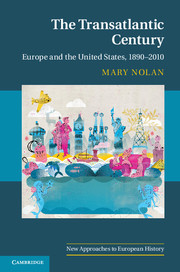Book contents
- Frontmatter
- Contents
- Illustrations
- Maps
- Tables
- Acknowledgments
- Introduction
- 1 An uncertain balance, 1890–1914
- 2 World War I: European crisis and American opportunity
- 3 Ambivalent engagement
- 4 The depression and transatlantic new deals
- 5 Strange affinities, new enemies
- 6 From world war to Cold War
- 7 Cooperation, competition, containment
- 8 Culture wars
- 9 The American Century erodes, 1968–1979
- 10 Renewed conflict and surprising collapse
- 11 A widening Atlantic
- 12 Imperial America, estranged Europe
- Suggested readings
- Index
- References
12 - Imperial America, estranged Europe
Published online by Cambridge University Press: 05 November 2012
- Frontmatter
- Contents
- Illustrations
- Maps
- Tables
- Acknowledgments
- Introduction
- 1 An uncertain balance, 1890–1914
- 2 World War I: European crisis and American opportunity
- 3 Ambivalent engagement
- 4 The depression and transatlantic new deals
- 5 Strange affinities, new enemies
- 6 From world war to Cold War
- 7 Cooperation, competition, containment
- 8 Culture wars
- 9 The American Century erodes, 1968–1979
- 10 Renewed conflict and surprising collapse
- 11 A widening Atlantic
- 12 Imperial America, estranged Europe
- Suggested readings
- Index
- References
Summary
Transatlantic divergence turned into stark disagreements when foreign policy issues like the mission of NATO, the response to ethnic cleansing in Yugoslavia, and above all the American war in Iraq were on the agenda. After 1989 America was the only military superpower. Indeed, by the late 1990s it imagined itself and was seen by people like the French Foreign Minister Hubert Vedrine as a “hyperpower,” which dominated in all categories of power. Yet, despite its vast military spending and dazzling arsenal of weapons, after the turn of the century, the United States became bogged down in multiple limited wars that it could neither win nor extricate itself from. These wars severely damaged the American economy and disturbed transatlantic relations. Western European states oscillated between vehement criticism of American interventions and reluctant and, in American eyes, insufficient support, while Eastern European states offered verbal endorsements but little practical help.
As America became more interventionist and unilateralist, much of Europe remained committed to multilateralism and more hesitant about military interventions within Europe or outside. United States interests have shifted away from Europe toward the Middle East, Central Asia, and China, while Europe has focused primarily on the expanding EU and the broader Mediterranean region. The American empire of bases, its distinctive post-1945 imperial innovation, continued to exist, but the United States, like Britain before it, found that empire is economically costly and politically corrosive without enhancing national security or stabilizing vast regions of the globe.
- Type
- Chapter
- Information
- The Transatlantic CenturyEurope and America, 1890–2010, pp. 356 - 373Publisher: Cambridge University PressPrint publication year: 2012

